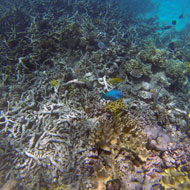New study fuels concerns about coral bleaching

“The fact that we are seeing an increase in bleaching even in these tough corals highlights just how serious the threat of coral bleaching is".
Coral bleaching across the Great Barrier Reef has been occurring since the late 18th century and is now taking place more frequently than in the past, a new study has found.
Bleaching occurs when water temperatures rise too high and disrupt the relationship between the coral and the algae that live inside it. As a result the coral expel the algae, leaving the coral a stark white. If the temperature remains too high, the algae cannot be reabsorbed and the coral will die.
According to the research, the frequency of bleaching events has increased markedly since the early 1800s and affected 10 per cent more corals since the late 1700s.
Co-author Dr Nick Kamenos, from the University of Glasgow, said the findings raise serious concerns that corals could be approaching a “critical threshold beyond which their long term survival is uncertain”.
The research team used cores extracted from corals that are hundreds of years old, to reconstruct the unique history of the bleaching events each coral had survived. This allowed them to study bleaching events going back four centuries for the first time.
Prior to this, little was known about the frequency and extent of bleaching events before the late 1970s.
Commenting on the findings, co-author Dr Sebastian Hennige from the University of Edinburgh, said: “For this study we used the most conservative methods we could in some of the toughest corals out there today.
“The fact that we are seeing an increase in bleaching even in these tough corals highlights just how serious the threat of coral bleaching is, and how important it is that we take action now to reduce this threat.”



 The Veterinary Medicines Directorate (VMD) is inviting applications from veterinary students to attend a one-week extramural studies (EMS) placement in July 2026.
The Veterinary Medicines Directorate (VMD) is inviting applications from veterinary students to attend a one-week extramural studies (EMS) placement in July 2026.